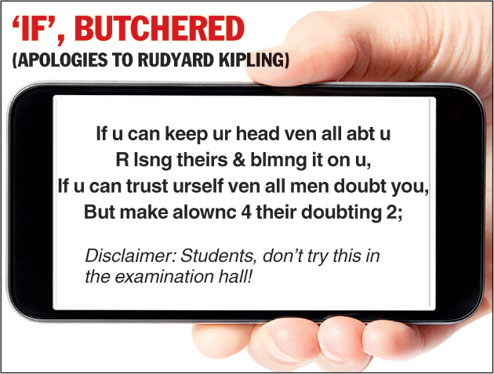 |
The language of mobile phones has invaded answer scripts, turning “textese” into a textbook example of how to anger an examiner.
Worried about students’ tendency to break into SMS language, schools are adopting ways to discourage the practice — from deducting marks to stressing the importance of formal writing.
A booklet recently circulated by the ICSE council among all affiliated schools underlines the need “to enhance the ability of students to express their ideas in clear and grammatically correct English”.
“Our children are so exposed to SMS language.... Isn’t this affecting our standard of English?” said Margaret Eastwood, the principal of Eastwood High School in Bangalore, while delivering the presidential address at the 91st annual conference of the Association of Heads of Anglo-Indian Schools in India at La Martiniere for Girls recently.
“It is going to be a hard task if we do not clamp down on the use of SMS language. In the last six months of this academic year, I have had to confiscate five mobile phones from children in my school. There are not many children who are without them these days!”
For a generation that communicates more through text messages, tweets, posts and status updates, shortening words and interspersing letters with digits and signs has become second nature.
“Most forms of written communication are now electronic, be it text messages or on social networking sites — both informal modes of communication. So it is only natural that students tend to slip into that mode even while writing their exams or class notes,” said Reeta Chatterjee, the principal of the two Apeejay schools in Calcutta.
Not only do students shorten conventional words — “govt” for government or “prog” for programme — they also use digits, signs and letters instead of complete words. So, ‘you’ becomes ‘U’, ‘are’ is ‘r’ and ‘at’ turns ‘@’.
‘Gr8’ (great), ‘thnx’ (thank you), ‘nite’ (night), ‘cud’ (could) and ‘remembr’ (remember) are some of the other textese that teachers come across.
“I find these errors mostly in essays and short stories or when students have to write in first person,” said Joseph Chacko, who teaches English at St. James’ School.
Teachers feel the habit could spell trouble for students and affect their knowledge of spellings and the language in the long run. So, deducting marks for the use of SMS spellings has become the deterrent of choice in many institutions.
“It is treated as a spelling error and marks are deducted,” said Basanti Biswas of Calcutta Girls’ High School.
St. James’ and Apeejay follow the same rule. But Modern High School for Girls believes in “precaution” rather than punishment. “We pre-empt certain situations and keep telling students the difference between spoken and written language,” said teacher Amita Prasad.
Students admit “the SMS effect” is hard to resist.
“We converse in text messages because it’s cheaper and convenient and we have to shorten our text because of space constraints, and so that we can type quickly. Even when I am taking notes in class, I use SMS language,” said a Class X student.
Some schools allow the use of SMS language on notice boards. “Students should be able to communicate informally,” said Chatterjee. “But such aberrations are not allowed in examinations.”
Devi Kar, the director of Modern High School for Girls, too advocates the middle path. “It (use of SMS language) is permissible if students learn to compartmentalise,” she said.
Do you find SMS lingo convenient or irritating? Tell ttmetro@abpmail.com











